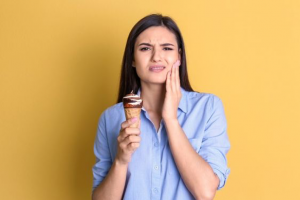6 Reasons Your Teeth May Be Sensitive

Tooth sensitivity or root sensitivity is a very common and often treatable condition. If your teeth feel uncomfortable or painful after having acidic, cold, or sweet foods and drinks, then you have sensitive teeth. Simple oral healthcare routines like switching to a desensitising toothpaste can reduce the sensitivity issue. If the problem is severe or persistent, then its best to see a dentist to find the underlying cause and treat it.
Click to see Brightside Dental’s practice principal discuss causes of tooth sensitivity : https://youtu.be/-7nbU6VPP6o
The following are 6 reasons which may make your teeth sensitive.
1. Brushing Teeth Forcefully – The use of a hard-bristled toothbrush and aggressively brushing your teeth exposes the tooth roots. This also damages the enamel of your tooth exposing the dentine located underneath the hard enamel causing discomfort while eating and drinking hot or cold items. Other than the cementum damage, over-brushing causes gum recession which exposes the soft parts of your tooth and nerve endings, which leads to pain and sensitivity. To prevent this, brush your teeth gently with a soft brush and if you are using a manual toothbrush, switch to an electric one which can be much kinder on your gums.
2. Dental Decay – If you have a cavity or dental decay affecting a tooth, this can often become sensitive when eating or drinking. However, please be aware that often there is no pain due to dental decay, even when it has progressed to an advanced stage.
3. Gum Disease and Recession – If you suffer from advanced gum (periodontal) disease this may lead to loss of supporting bone around your teeth and cause gum recession. If left untreated, this can cause infection, damage the surrounding tissue, and further degrade the bone structure of your teeth. Sometimes, it can also lead to receding gums i.e. loss of teeth. Other physical factors that lead to receding gums include misaligned teeth, grinding your teeth, tongue piercings, or damage from dental treatment.
4. Acid Damage – Intake of foods and drinks that are high in acid levels can cause tooth erosion. Foods high in acid levels are oranges, lemons, tomatoes, pickled products, and limes. Excessive drinking of drinks like fruit juice, wine, and sports and fizzy drinks can soften the enamel of your teeth. If you combine acidic foods with frequent brushing sessions, then the enamel erosion process quickens further.Acid erosion can also be caused from certain medical conditions; reflux; regurgitation; prolonged sickness or eating disorders.The common symptoms of tooth erosion are tooth discoloration and sensitivity.
5. Dental Treatments – Teeth can become sensitive following dental treatment, which may be hygienist or restorative dental treatment such as fillings, crown work or root canal. This will usually settle within a few days or 1-2 weeks. If not, do seek advice from your dentist.
6. Teeth Whitening – Teeth whitening is a simple procedure used to brighten teeth and freshen up your smile. The use of whitening products during teeth whitening can cause sensitivity. According to Reader’s Digest, almost 78% of people who undergo teeth whitening felt some tooth sensitivity. Most professionals use hydrogen peroxide to carry out this procedure. Many people feel the discomfort and sensitivity due to a chemical reaction that occurs within the tooth. During the procedure, you might feel tooth discomfort and temporary gum irritation as well. The only side effect that comes with it is the sensitivity, which is short term and fades away with time. Only carry out whitening after assessment with a qualified dental professional and under their advice as over the counter/internet kits and treatments offered by beauty salons are illegal and can often permanently damage your teeth.
See next weeks blog for advice of how to help manage and treat sensitivity.
Thanks to Emma Gill for contribution to this post.

